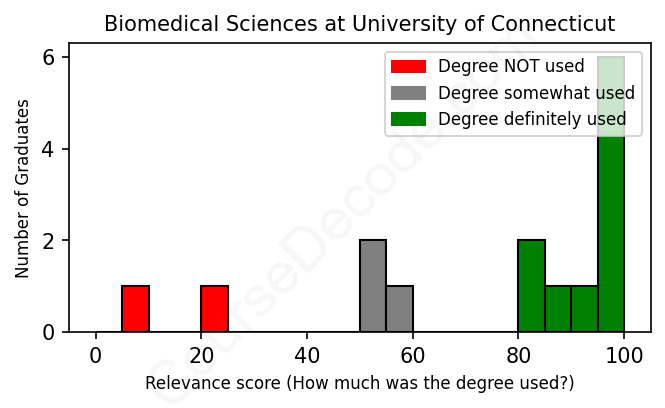
First, some facts. Of the Biomedical Sciences graduates from University of Connecticut we've analyzed , here's how many have used (or NOT used) their degree in their career:

These are estimates based on AI analysis of 15 LinkedIn profiles (see below).
The verdict? Above average. Overall, with an average relevance score of 74%, Biomedical Sciences graduates from University of Connecticut have a higher likelihood (+7%) of finding work in this field compared to the average graduate across all fields:
And for comparison, here's the chart for all profiles we've looked at across all degrees.
Also, after graduating, 53% of these graduates have pursued further education other than another Bachelor's degree (such as a Masters degree or other), compared to the average across all profiles of 35%. This suggests you may need more than just a Bachelors degree to be competitive as a Biomedical Sciences graduate.
See the details:
|
Relevance score: 81% We think this person has gone into a career highly relevant to their degree. We think this person has gone into a career highly relevant to their degree.
DEGREE INFOGraduated in 2020 from University of Connecticut with a Bachelor's degree in Biomedical Sciences. Also pursued further education since (see below). JOB HISTORY SINCE GRADUATIONDigital Associate: Support & Operations Pfizer Jun 2020 - Jun 2021 Digital Associate: Blockchain Innovation Team  Pfizer Jun 2021 - Jan 2022 Senior Associate Computational Software Engineer  Pfizer Jan 2022 - Present FURTHER DEGREES DONE SINCE GRADUATINGMaster's degreeGeorgia Institute of Technology 2022 - 2025 ABOUTAspiring software developer with background in life sciences. |
The top 10 most common jobs done by the graduates we've analyzed (ranked most common to least) are:
When looking at the job trajectories of people who graduated with a Biomedical Sciences degree from the University of Connecticut, it's clear that many of them ended up in positions that are somewhat related to their academic background. The most common types of roles include Clinical Engineer positions, R&D engineers, and various engineering roles in companies focused on medical devices. These jobs typically leverage the knowledge and skills acquired during their studies, with many directly applying concepts from biomedical sciences in their daily work. For example, roles like Clinical Engineer or Biomedical Engineer involve significant interactions with medical technologies and patient care systems, which makes them highly relevant.
However, not everyone seems to stick closely to biomedical-related jobs. There are quite a few instances where graduates take on roles that are more tangential or not clearly aligned with their degree. Jobs like webmasters and pottery assistants don't draw on their biomedical knowledge at all. Additionally, some positions in engineering or technology sectors, like project management or support roles, while possibly touching on biomedical concepts, don't fully utilize the core skills gained from a biomedical sciences education. Overall, while many graduates find solid careers in biomedical fields, others explore varied paths that don’t directly relate to their degree, showing that a Biomedical Sciences degree can open many doors, even those that lead away from traditional biomedical roles.
Here is a visual representation of the most common words in job titles for Biomedical Sciences graduates (this is across all Biomedical Sciences graduates we've analyzed, not just those who went to University of Connecticut):

Looking at the career paths of people who graduated with a Biomedical Sciences degree from the University of Connecticut, it seems like many have landed jobs that are related to their field right out of college. For their first jobs, a lot of graduates went into roles like clinical engineering, research assistance, or engineering internships, which typically leverage their scientific knowledge and technical skills. Companies like Kaiser Permanente, Medtronic, and other healthcare-related sectors are notable employers, showing a trend where graduates are able to find positions that capitalize on their education fairly quickly after graduating.
Fast forward five to ten years, it looks like many of these alumni have progressed to even more significant roles in their respective fields. Positions like Clinical Engineering System Director and Senior Design Engineer highlight a career trajectory that is fairly stable and upward-moving within biomedical sciences and engineering industries. However, there are some graduates whose paths veer off into less directly related roles or industries, like web management or positions that seem unrelated to their degree. Overall, while there are exceptions, it seems that many UConn biomedical sciences graduates are finding their way into solid and relevant careers in healthcare and engineering fields, which is a promising sign for future graduates considering this path.
Getting a Bachelor’s degree in Biomedical Sciences at the University of Connecticut can be pretty challenging, just like most science degrees. You’ll dive deep into subjects like biology, chemistry, and anatomy, which can be tough, especially if you’re not super into science or math. Expect a lot of labs and heavy coursework, which means you’ll need to stay on top of your studies and manage your time well. That said, if you have a passion for the subject and are willing to put in the effort, it can be a rewarding experience. Overall, it’s harder than some other degrees, but students who really enjoy science will likely find it fulfilling!
Most commonly, in the LinkedIn profiles we've looked at, it takes people 4 years to finish a Bachelor degree in Biomedical Sciences.
So, looking at these UConn Biomedical Sciences grads, it seems like most of them have climbed the career ladder pretty well, especially those who graduated a bit earlier and landed jobs in solid companies like Kaiser Permanente, Medtronic, or even the engineering roles at places like General Dynamics. They likely make a decent salary, especially in clinical engineering and R&D, where you can expect to earn a good paycheck. On the flip side, the more recent grads, like the ones from 2022 and 2023, seem to be in earlier career stages with internship and entry-level roles, which typically pay less. Overall, while it looks like many of these folks are on paths that can lead to good money in the future, some are still in that grind to get there.
Here is a visual representation of the most common words seen in the "about" section of LinkedIn profiles who have a Bachelor degree in Biomedical Sciences (this is across all Biomedical Sciences graduates we've analyzed, not just those who went to University of Connecticut). This may or may not be useful:

Here are all colleges offering a Bachelor degree in Biomedical Sciences (ordered by the average relevance score of their Biomedical Sciences graduates, best to worst) where we have analyzed at least 10 of their graduates:
| College | Score | Count |
|---|---|---|
 Western Michigan University Western Michigan University
|
81 | 17 |
 Marquette University Marquette University
|
78 | 29 |
 University of Michigan University of Michigan
|
77 | 10 |
 Colorado State University Colorado State University
|
77 | 19 |
 University at Buffalo University at Buffalo
|
75 | 18 |
 California Polytechnic State University-San Luis Obispo California Polytechnic State University-San Luis Obispo
|
74 | 13 |
 University of Connecticut University of Connecticut
|
74 | 15 |
 Texas A&M University Texas A&M University
|
73 | 59 |
 Auburn University Auburn University
|
71 | 26 |
 Northern Arizona University Northern Arizona University
|
71 | 15 |
 Rensselaer Polytechnic Institute Rensselaer Polytechnic Institute
|
70 | 10 |
 University of Central Florida University of Central Florida
|
69 | 26 |
 University of South Florida University of South Florida
|
68 | 48 |
 Georgia Institute of Technology Georgia Institute of Technology
|
67 | 41 |
 The Ohio State University The Ohio State University
|
64 | 14 |
 Rochester Institute of Technology Rochester Institute of Technology
|
64 | 12 |
 Case Western Reserve University Case Western Reserve University
|
63 | 12 |
 Grand Valley State University Grand Valley State University
|
59 | 35 |
 Arizona State University Arizona State University
|
58 | 12 |